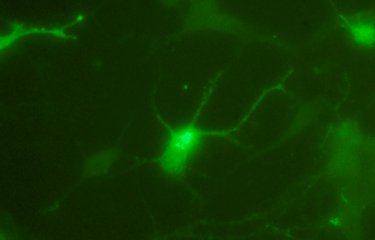Researchers at Institut Pasteur recently proved the efficacy of a candidate vaccine against West Nile virus infection in animal model. Their results are published in the Journal of Infectious Diseases. Mosquito-borne West Nile virus is an emerging neurotropic pathogen which is particularly disquieting due to its recent emergence in North America : since 2002, more than 13,000 cases, including 500 deaths, have been reported in the United States. This virus is also being closely monitored in France, particularly in the Camargue, where infections in horses appeared in 2000.
Press release
Paris, january 6, 2005
The research teams at Institut Pasteur, led by Frédéric Tangy (Slow Virus Unit) and Philippe Desprès (Flavivirus-Host Molecular Interactions Unit) have developed a candidate vaccine against West Nile Virus infection using a recombinant vaccine strain of measles virus. The protective antigen for the West Nile virus (E envelope protein) is produced by the Schwarz vaccine strain of measles virus, which is the most commonly used pediatric live-attenuated measles vaccine in the world, and whose efficacy and safety have been proven for decades.
In an experimental model of West Nile virus infection, animals vaccinated with this "combined" measles/West Nile vaccine were completely protected against lethal doses of West Nile virus challenge, while all control animals died rapidly of viral encephalitis.
This result is doubly significant for scientists. In addition to the advantage of having an immediate medical vaccine against West Nile disease, it supports research aiming to use measles vaccine as a new high-performance and safe vaccination vector. Once "recombined," this vector makes it possible to offer, simultaneously, a protective immunity against measles - a priority disease in terms of public health, mainly in developing countries - and against another emerging pathogenic agent of medical interest. Researchers at Institut Pasteur are currently developing recombinant measles vaccines against HIV/AIDS but also against dengue, Japanese encephalitis and yellow fever, which are deadly human diseases caused by viruses related to the West Nile virus.
West Nile Virus (from the name of a district in Uganda where it was isolated in humans for the first time in 1927) is transmitted by Culex mosquitoes. The infection is characterized by a brutal occurrence of a high fever after a 3 to 6 day incubation period, which, in approximately 15% of cases, can cause neurological manifestations: meningitis, encephalitis, and poliomyelitis-like syndrome. Generally, patients recover spontaneously, sometimes with relapses. However, the disease can be fatal in elderly, and sometimes in young children.
Currently considered to be the most widespread "flavivirus" after dengue, West Nile virus affects people sporadically or epidemically. Human cases of West Nile Virus were reported in Africa, the Middle East, India, Europe, and more recently in America, where a first epidemic occurred in New York City in 1999. Since then, it has spread widely in the United States (9,862 cases and 264 deaths in 2003), where its presence is currently detected in over forty states, and also affects Canada and Mexico. In France,* cases of infection appeared in horses in the Camargue in 2000 and one human case was reported in 2003 in the Var.
* West Nile Virus is monitored in France by the National Reference Center for Arboviruses and Hemorrhagic Fevers at Institut Pasteur, located in Lyon.
Sources
"Live measles vaccine expressing the secreted form of the West Nile virus envelope glycoprotein protects against West Nile virus encephalitis:" Journal of Infectious Diseases, January 15, 2005.
Philippe Desprès (1), Chantal Combredet (2), Marie-Pascale Frenkiel (1), Clarisse Lorin (2), Michel Brahic (2) and Frédéric Tangy (2)
1. Flavivirus-Host Molecular Ineractions Unit, Institut Pasteur, Paris
2. Slow Virus Unit, Institut Pasteur, Paris
Contact press
Institut Pasteur Press Department
Corinne Jamma
01 40 61 33 41 - cjamma@pasteur.fr
Nadine Peyrolo
01 45 68 81 47 - npeyrolo@pasteur.fr
The Institut Pasteur is a private, non-profit foundation dedicated to biomedical research, public health, and education. Nearly 2,600 people work at its Paris campus, where a large part of the research focuses on infectious diseases. Throughout the world, 29 Instituts Pasteur are spread out across five continents, bringing together 9,000 people.




